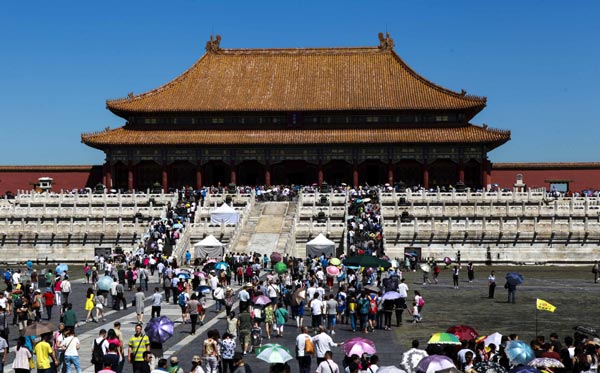Palace Museum adopts visitor registration
|
|
|
Crowds of tourists visit the Palace Museum, which had received more than 100,000 visitors a day during peak times. Jin Liangkuai / Xinhua |
Saturday saw the introduction of a real-name registration system for the purchase of tickets to visit the Palace Museum, also known as the Forbidden City. Visitors now have to present ID cards or passports.
At the same time, the museum introduced a policy to keep the daily number of visitors to below 80,000.
The introduction of the measures coincided with the 10th Chinese Cultural Heritage Day, which falls on the second Saturday of June.
According to Shan Jixiang, director of the museum, the measures were taken to ensure safety and create a better visiting experience. The real-name system will keep ticket scalpers and unlicensed tour guides out of the museum.
Research by the museum shows that it retains its best visitor experience when the number of visitors is 30,000 each day. Both the safety of relics on display and the comfort of visitors are threatened when the number exceeds 80,000.
During peak visiting times, such as the summer vacation period and May Day and National Day holidays, the museum had received more than 100,000 visitors a day.
"With the controls we have introduced, the number of visitors will become more balanced so that the safety of both cultural relics and visitors will be guaranteed, and visitors will feel more comfortable visiting the museum," Shan said.
To reduce the time people have to wait in a line to buy tickets, the museum has also stopped selling tickets to tourist groups on site and encourages all visitors, whether in groups or as individuals, to book tickets ahead of time online.
On Saturday, the museum received more than 50,000 visitors, and the number of people who booked the tickets online increased greatly, according to Shan.
Katerina Galajdova, a 24-year-old student from the Czech Republic, said the Palace Museum was one of the first places she visited after she arrived in Beijing last summer.
She and her friends bought the tickets directly at the site and found it convenient. But she understood the need for the real-name system and control initiatives.
"I think this system would probably be better for security, and foreign tourists have to carry their passport anyway," she said.
"It is totally understandable there should be controls on who exactly is going there because it is one of the most visited places in all of China," she said.
"Security and control should be high. For me, the new measures are definitely not inconvenient."
Shan said the control on the number of visitors is just temporary and the museum will be able to accept more visitors in the future when more parts of it become open to the public.
"At present, visitors only have access to 52 percent of the museum. The proportion will rise to 65 percent later this year and 76 percent next year," he said.


